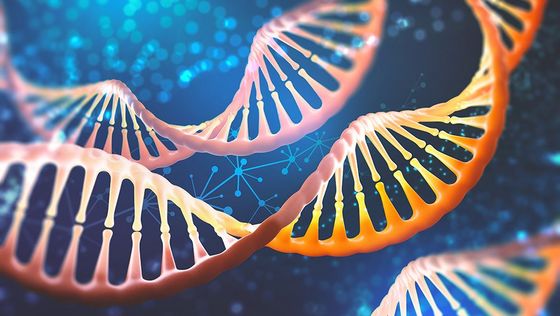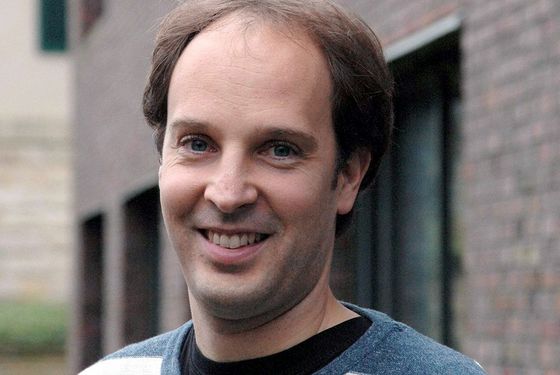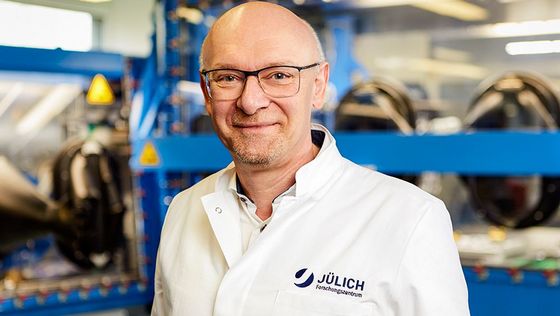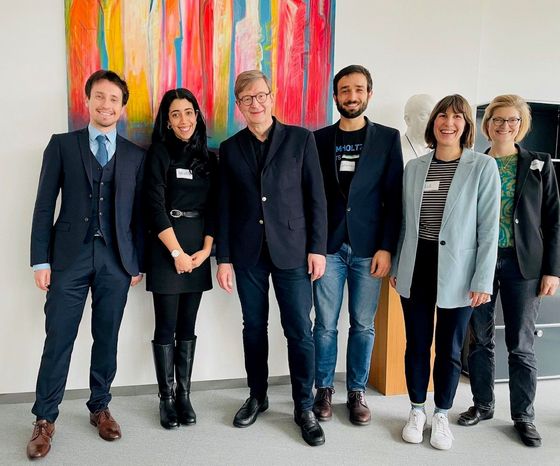|
||||||||
|
||||||||||||||||||||||||
|
|
You are used to being informed about the most important topics and discussions from the Helmholtz world with our newsletter. Free of charge and without advertising. This issue is different. Together with around 500 other institutions from science, business and society, Helmholtz is supporting the campaign #Zusammenland - Vielfalt macht uns stark. The message: Open-mindedness, respect and community are values that make Germany not only a good place to live, but also an economically strong country. That is why we stand together for an open country that courageously faces difficulties. |
|
|
|
|||||||||||||||||||||||
|
|
||||||||||||||||||||||||||||||
|
The Helmholtz Association has launched an initiative to harness the recent advancements in AI and the rise of “Foundation Models”. All Helmholtz researchers are eligible to apply. The deadline is March 15, 2024. Go to the call for proposals |
|
|
|
The genetic information in our cells harbors secrets about the risks, progression, and complications of many diseases. With hundreds of millions of patients worldwide, identifying and understanding genetic risk for type 2 diabetes is of particular interest. In collaboration with an international team of scientists, Prof. Eleftheria Zeggini from Helmholtz Munich and the Technical University of Munich (TUM) has conducted a comprehensive study with data from millions of individuals. Their research unveiled over 600 disease-associated genetic loci and generated risk scores for diabetes complications. The insights from the largest type 2 diabetes genome-wide association study to date are now published in Nature. Collaboration among scientists is essential for evaluating vast patient data and achieving a comprehensive understanding of genomic risk variants. Helmholtz Munich scientists are part of the newly formed Type 2 Diabetes Global Genomics Initiative (T2D-GGI). The first outcome of the initiative is the largest genome-wide association study (GWAS) to date. GWAS is a scientific method used to find genetic variation associated with a disease. “Our work leads to an improved understanding of disease-causing biological mechanisms. Better knowledge of progression risk for T2D complications can help put in place early interventions to delay or even prevent these debilitating medical conditions,” says Eleftheria Zeggini. (Image: Yurchanka Siarhei/Shutterstock)
Gene editing precisely repairs immune cells |
|
When I have a new idea, I want to try it out immediately. That sometimes gives me sleepless nights. When I then discover a new connection that no one has ever seen before, I find it really exciting, almost sublime! And even if it’s just a small thing, I'm happy about it. I‘m even happier when the students I supervise have this experience.
My dream would be to have a gravitational wave detector available, with maximum sensitivity in the kilohertz range. I would also need a large computer for code development and, of course, employees to interpret the measured signals. This would allow me to explore many exciting topics: Unanswered questions about phase transitions in quantum chromodynamics, the formation of elements in stars and the merging of neutron stars, black holes, the Hubble constant and much more! On the other hand, I would also be interested in trying out something completely different, perhaps outside of physics, for example, an expedition.
I can think of many, it’s a shame I can't make a list! But if I have to choose: Armin Maiwald from “Sendung mit der Maus”. I just really like the show and I think a format like that is very important. I would like to talk to Armin Maiwald about the best way to impart knowledge and the role curiosity plays in acquiring knowledge. |
|
|
|
Batteries are the key technology for a successful energy and mobility transition. After many years of inactivity in funding in this field of research, around one billion euros have been invested in the development of German battery research by the BMBF alone over the last 15 years. As an instrument for climate protection, battery research in Germany has been massively funded by the federal and state governments in recent years. Now the Federal Ministry of Education and Research (BMBF) is cutting funding for new projects in 2024 to 20 million euros from the 180 million euros earmarked for the Climate Transformation Fund. Although projects that have already been started can be completed with funds that have already been approved, there will not be enough money for planned new projects. According to current planning, a total of 70 million euros has been allocated until 2028, but German battery research will need more than 750 million euros by then. In Münster alone, around 500 employees work in battery research. The majority of whom are financed by BMBF project funding, which means that many of them cannot be retained in the future or cannot be replaced after leaving for industry. With the help of research funding, for example, master's and doctoral theses are created. As it stands, Germany will lose top scientific personnel and their expertise in battery research. We are already experiencing a severe shortage of skilled labor in industry, and the cuts will exacerbate the situation. And we are sending a fatal signal to young people who are considering studying in our field. They will see fewer opportunities and turn to other fields. Project funding means a targeted investment in research AND education. Young talents in Germany are essential for companies as they play a major role in the transfer of technology from research to industry. Due to dwindling funds and dwindling reputations, this will no longer be sustainable in the future. Companies based in Germany will go where they can find skilled labor, and that will not be in Germany, which also offers overall less competitive framework conditions for this industry. After many years of development, the time has now come for us to transfer our research results to industry. German industry is currently expanding production in the field of electromobility. The technology is reporting record-breaking market growth of 37 per cent per year. Particularly in Germany, a country with a strong automotive industry, we must avoid losing touch internationally or even be left behind completely, but must keep the location attractive for investment otherwise, we face the threat of a further intensification and acceleration of deindustrialization. The last few years have shown what we can achieve thanks to a consistent and structured funding policy. The value chain of the energy and mobility transition begins with research and this requires clarity, reliability and prioritization as to which technologies are to be sustainably funded. The federal government could make the necessary funding available again in a new budget and for the coming years. Then the decision to cut funding for 2024 will just mean a still sensitive break, but not a definitive end to German battery research. (Photo: HI MS/Kraft) |
|
In the HySPRINT Innovation Lab at the Helmholtz-Zentrum Berlin (HZB), researchers are developing metal halide perovskite solar cells. HZB is continuously expanding the HySPRINT Innovation Lab and is looking for a new technical coordinator for this infrastructure. If you have both scientific and technical expertise, enjoy working in international and multidisciplinary teams and would like to help achieve ambitious goals, the colleagues at the center look forward to receiving your application (until March 3, 2024).
|
|
|
|
|
On February 14 and 15, Helmholtz President Otmar D. Wiestler met with the Helmholtz Juniors in Berlin. They discussed topics such as improving working conditions and communication as well as expanding networking opportunities. The Helmholtz Juniors are an initiative in which Helmholtz Association doctoral researchers network. They are committed to fair working conditions and a wide range of training opportunities. For more information and networking see: Helmholtz Juniors on LinkedIn (Photo: Helmholtz) |
Published by: Helmholtz Association of German Research Centres, Anna-Louisa-Karsch-Str.2, 10178 Berlin Editors: Sebastian Grote, Franziska Roeder, Martin Trinkaus Photo credit: Phil Dera (Editorial) No subscription yet? Click here to register If you no longer wish to receive our newsletter, simply click here: Unsubscribe © Helmholtz
|
![[Translate to Englisch:] [Translate to Englisch:]](https://www.helmholtz.de/assets/helmholtz_gemeinschaft/_processed_/7/8/csm_Martin_Trinkaus_Monthly_600x600_02_23e1fa7729.png)



